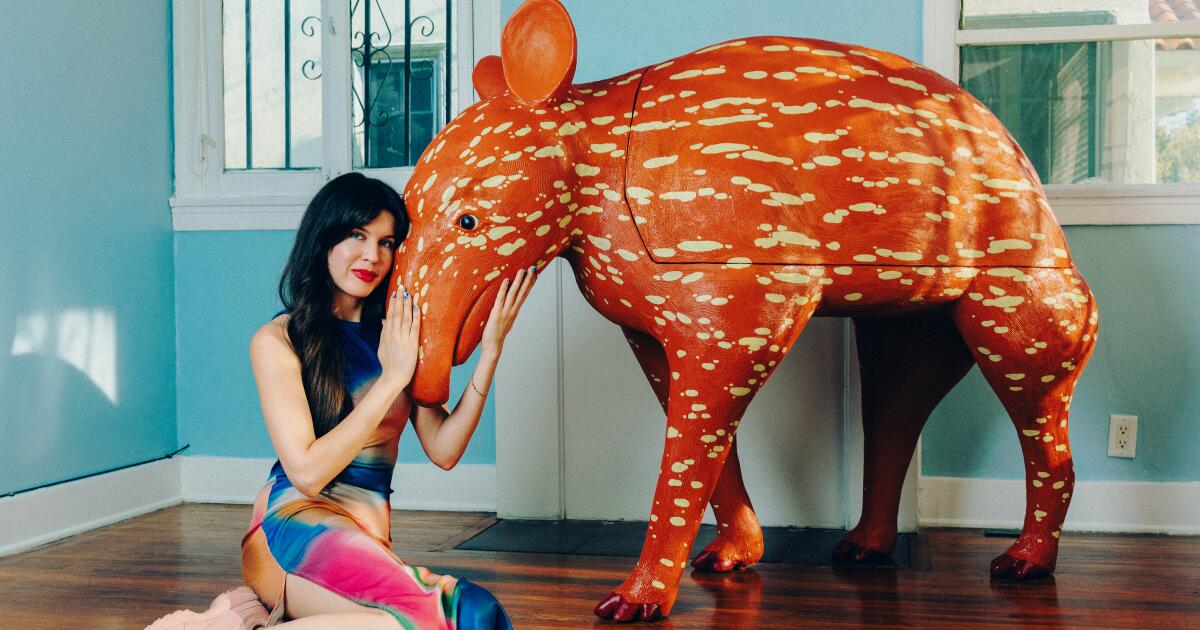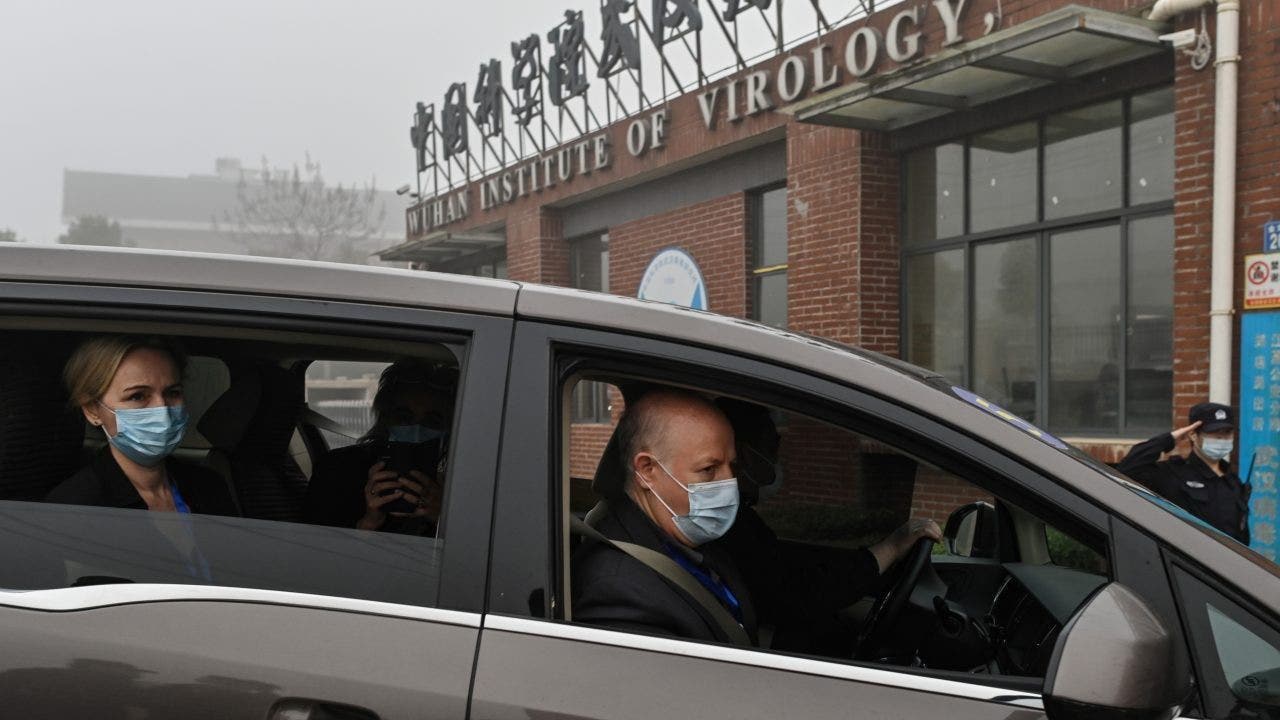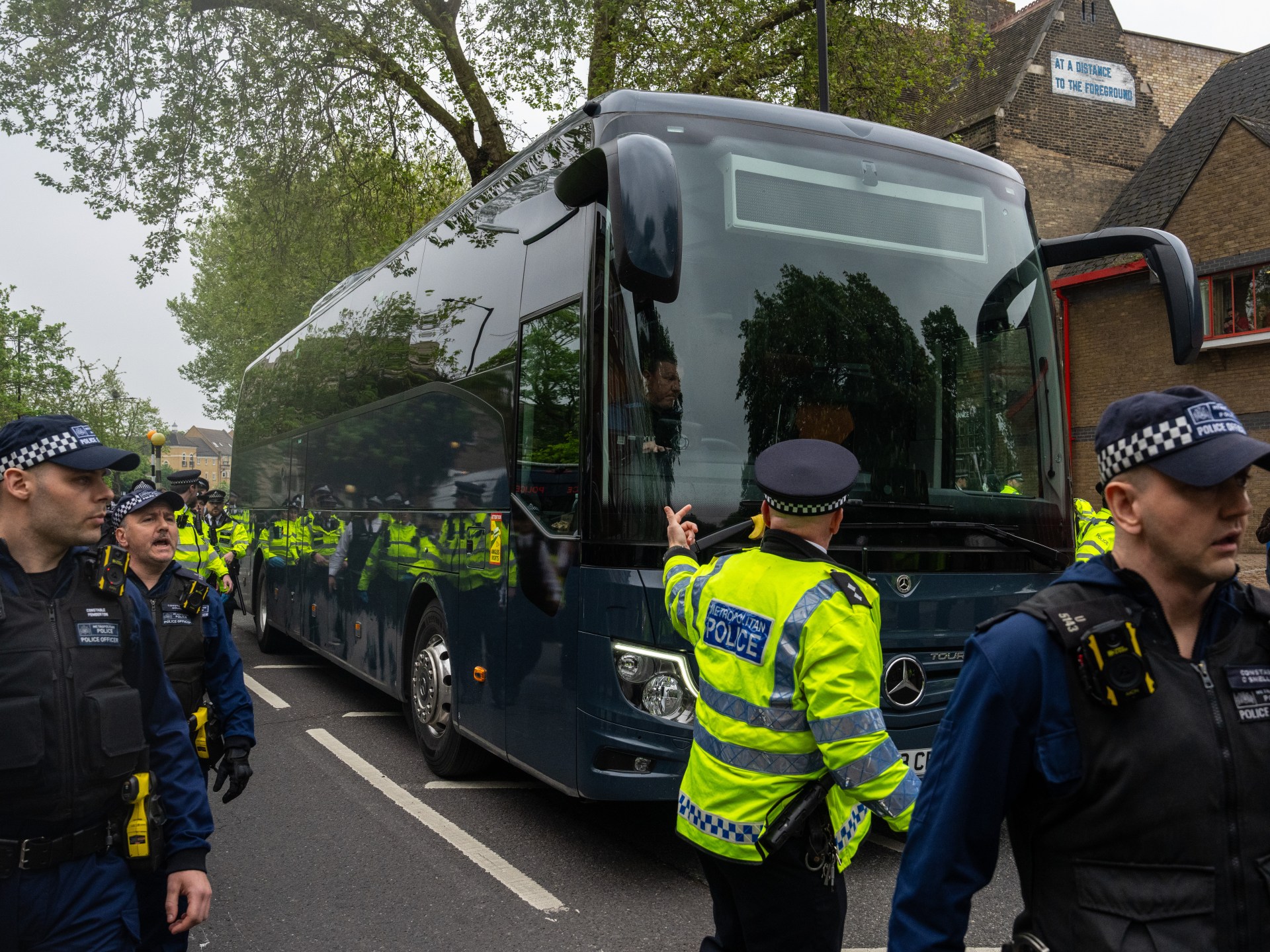Reporting by Sudip Kar-Gupta, writing by Tassilo Hummel
World
Chemena Kamali appointed creative director at French fashion house Chloe

PARIS, Oct 9 (Reuters) – Chemena Kamali was appointed as new creative director of French fashion label Chloe on Monday, the company said in a statement.
Kamali will present her first pre-collection for the brand in Paris in January, followed by the fall-winter 2024 collection during the Paris Fashion Week in February.
Our Standards: The Thomson Reuters Trust Principles.

World
Meloni plans to rally Europe's centre-right in elections pledge
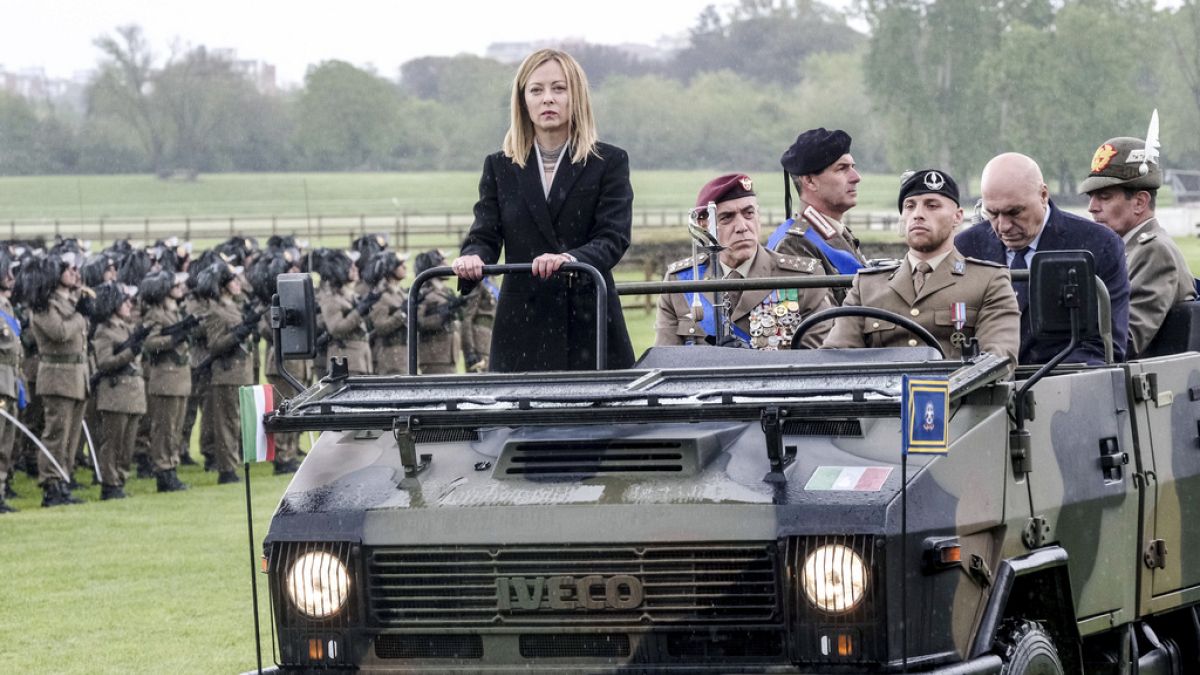
In the run-up to the European elections in June, Euronews takes a closer look at the Brothers of Italy party leader and the country’s prime minister’s speech in Pescara.
The Brothers of Italy’s conference in Pescara was more than a party gathering to launch Meloni’s electoral campaign.
The event marks a key moment in the run-up to the European elections in June, with the Italian prime minister’s address last Sunday providing crucial insight into her conservative leadership in Europe and her EU goals.
At the event, she announced that voters should use just her first name on their ballots. “Call me Giorgia,” she said.
The move is legal, and while many, including her rivals, have criticised her decision, it aligns with her image as a leader with working-class roots who took her first step into politics in Rome’s Garbatella district.
In both her role as Italy’s PM and president of the ECR group, Meloni outlined her vision for Europe.
Notably, she spoke of Brothers of Italy’s increased support over the years since the last European elections in 2019, while commenting on her ambitions to extend what her party has achieved in Italy to the rest of Europe.
“We want to do in Europe what we did in Italy … create a majority that brings together the centre-right forces and send the left into opposition,” Meloni said in Pescara in what has since been highlighted as a key statement.
Alliances based on issues, not ideals
A closer look at Meloni’s speech can help better understand what she has in mind. As ECR Co-Chairman Nicola Procaccini told Euronews, “Meloni refers to a spectrum of positions which sees both the ECR and the EPP as the two main axes when she talks about the creation of a majority that brings together centre-right forces.”
“Then, some delegations from ID in the right-wing camp,” adds Procaccini, “along with others from Renew Europe … will make up the total number that is needed to reach the majority to vote in favour of some measures.”
According to Procaccini, it is crucial to understand that the idea of “majority” within the new 720 seats-strong European Parliament is not fixed and that finding common ground with other political forces remains a possibility.
“Majorities or minorities form themselves based on the single vote. I do believe that the balance within the next European Parliament will shift to the right,” Procaccini said, adding that the EPP and a large part of Renew Europe are already voting alongside ECR, PiS or Viktor Orban’s Fidesz.
“It’s already happening today,” Procaccini continued, “not because there’s a deal in place, but based on the issues we are voting on.”
And as for sending the left into opposition, “it’s about giving the EPP the possibility to break the bond it has built with the socialists and the greens,” Brothers of Italy MP Sara Kelany told Euronews.
World
Norwegian Islamist wanted over deadly shooting at LGBTQ+ festival is being sent back from Pakistan

COPENHAGEN, Denmark (AP) — A radical Norwegian Islamist who is suspected of complicity in the deadly shooting at an LGBTQ+ festival in Oslo two years ago has been expelled from Pakistan and is on his way to Norway, the Scandinavian country’s government said Friday.
Two people were killed and nine seriously wounded in the shooting at three locations, chiefly outside the London Pub, a popular gay bar in Oslo’s nightlife district, on June 25, 2022.
Arfan Bhatti, who is to land in Oslo later Friday, allegedly posted statements online about killing gay people, Norwgian media have said.
Bhatti knew Zaniar Matapour, the main suspect in the attack that the Norwegian Police Security Service has called an “Islamist terror act.” Matapour has since March been on trial in Oslo for the shooting, accused of terrorism.
A Norwegian citizen born in Oslo to Pakistan immigrants, Bhatti who has a past in criminal gangs, was a leading figure in radical Islamic circles in Norway for years, chiefly known as the leading figure in an Islamic State-affiliated group in the country.
The 46-year-old was not in Norway in 2022 but likely in Pakistan, Justice Minister Emilie Enger Mehl said. His role in the 2022 shooting was unclear and Norwegian police have said that with Bhatti’s return to Norway, they “want to continue with the extensive investigations to shed light on what involvement Bhatti may have had in the attack.”
“No matter where in the world someone is, they should know that the Norwegian authorities are doing everything we can to bring them to Norway,” Enger Mehl told a press conference.
Norwegian police said that although there is no extradition agreement with Pakistan, Pakistani authorities have made it possible “to complete the investigation into the terrorist case.”
Upon arrival in Norway, Bhatti will be detained and face a custody hearing during the weekend, police said.
Bhatti could be called upon testifying in the trial at the Oslo District Court against Matapour. Bhatti’s lawyer John Christian Elden said his client has nothing to do with the 2022 shooting.
”Whether he is guilty is up to the legal system to decide,” Enger Mehl said.
Matapour, a Norwegian citizen originally from Iran, allegedly fired 10 rounds with a machine gun and eight shots with a handgun into a crowd before being detained by bystanders. Following the attack, a Pride parade was canceled, with police saying they couldn’t guarantee security.
Matapour who had sworn allegiance to the Islamic State group, has refused to speak to investigators. If found guilty, he faces 30 years in prison.
World
War-scarred village in Ukraine finds solace in vibrant new church
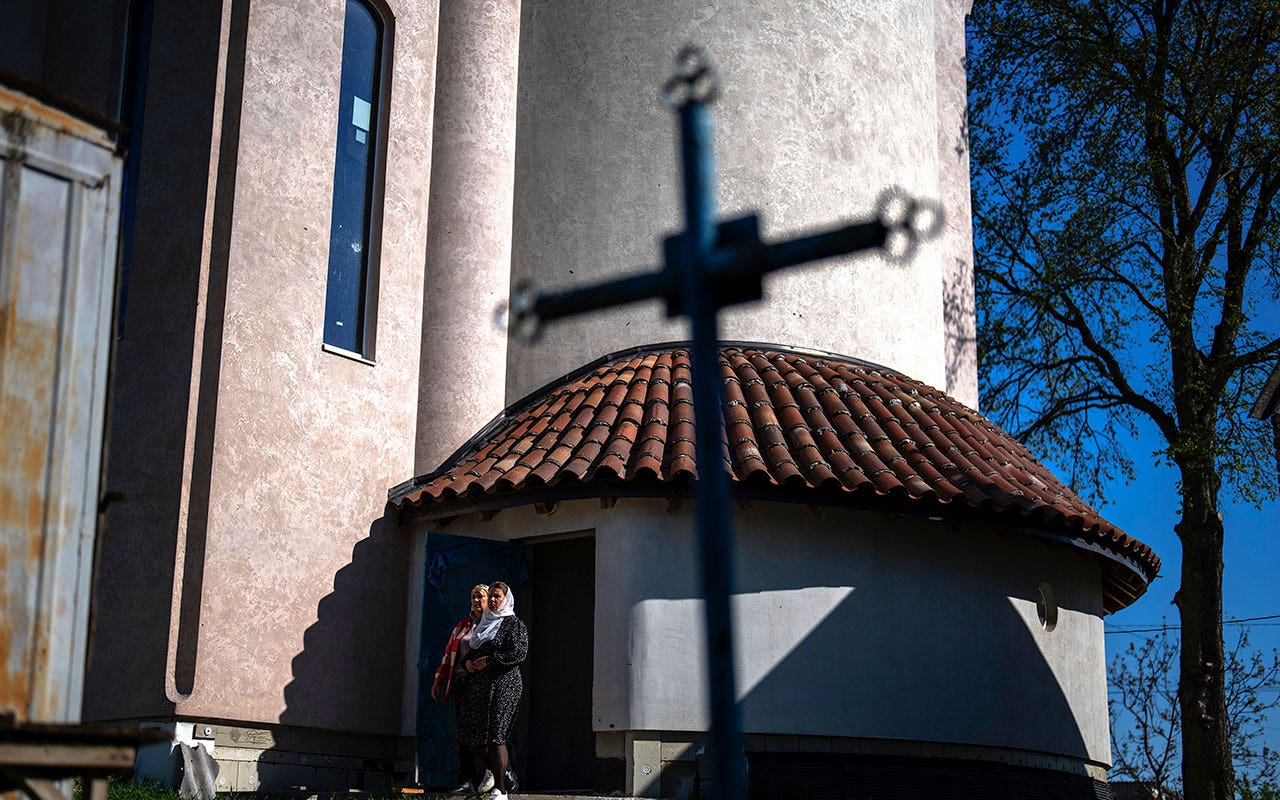
- The Church of the Intercession of the Blessed Virgin Mary in Lypivka sheltered nearly 100 residents during the 2022 Russian occupation.
- The church, with a history spanning more than 300 years, halted construction during the 2022 invasion but has since resumed.
- The majority of Ukrainians identify as Orthodox Christians, with the Lypivka church affiliated with the independent Orthodox Church of Ukraine.
This Orthodox Easter season, an extraordinary new church is bringing spiritual comfort to war-weary residents of the Ukrainian village of Lypivka. Two years ago, it also provided physical refuge from the horrors outside.
Almost 100 residents sheltered in a basement chapel at the Church of the Intercession of the Blessed Virgin Mary while Russian troops occupied the village in March 2022 as they closed in on Ukraine’s capital, Kyiv, 40 miles to the east.
“The fighting was right here,” the Rev. Hennadii Kharkivskyi said. He pointed to the churchyard, where a memorial stone commemorates six Ukrainian soldiers killed in the battle for Lypivka.
KYIV’S FORCES ARE UP AGAINST A CONCERTED RUSSIAN PUSH IN EASTERN UKRAINE, A MILITARY OFFICIAL SAYS
“They were injured and then the Russians came and shot each one, finished them off,” he said.
Christian Orthodox worshippers leave the chapel basement after attending a service at the Church of the Intercession of the Blessed Virgin Mary in Lypivka, near Lviv, Ukraine, on April 28, 2024. (AP Photo/Francisco Seco)
The two-week Russian occupation left the village shattered and the church itself — a modern replacement for an older structure — damaged while still under construction. It’s one of 129 war-damaged Ukrainian religious sites recorded by UNESCO, the United Nations’ cultural organization.
“It’s solid concrete,” the priest said. “But it was pierced easily” by Russian shells, which blasted holes in the church and left a wall inside pockmarked with shrapnel scars. At the bottom of the basement staircase, a black scorch mark shows where a grenade was lobbed down.
But within weeks, workers were starting to repair the damage and work to finish the solid building topped by red domes that towers over the village, with its scarred and damaged buildings, blooming fruit trees and fields that the Russians left littered with land mines.
UKRAINE’S ZELENSKYY URGES FASTER US WEAPON DELIVERIES
For many of those involved — including a tenacious priest, a wealthy philanthropist, a famous artist and a team of craftspeople — rebuilding this church plays a part in Ukraine’s struggle for culture, identity and its very existence. The building, a striking fusion of the ancient and the modern, reflects a country determined to express its soul even in wartime.
The building’s austere exterior masks a blaze of color inside. The vibrant red, blue, orange and gold panels decorating walls and ceiling are the work of Anatoliy Kryvolap, an artist whose bold, modernist images of saints and angels make this church unique in Ukraine.
The 77-year-old Kryvolap, whose abstract paintings sell for tens of thousands of dollars at auction, said that he wanted to eschew the severe-looking icons he’d seen in many Orthodox churches.
“It seems to me that going to church to meet God should be a celebration,” he said.
There has been a church on this site for more than 300 years. An earlier building was destroyed by shelling during World War II. The small wooden church that replaced it was put to more workaday uses in Soviet times, when religion was suppressed.
Kharkivskyi reopened the parish in 1992 following the collapse of the Soviet Union, and set about rebuilding the church, spiritually and physically, with funding from Bohdan Batrukh, a Ukrainian film producer and distributor.
Work stopped when Russian troops launched a full-scale invasion of Ukraine on Feb. 24, 2022. Moscow’s forces reached the fringes of Kyiv before being driven back. Lypivka was liberated by the start of April.
Since then, fighting has been concentrated in the east and south of Ukraine, though aerial attacks with rockets, missiles and drones are a constant threat across the country.
By May 2022, workers had resumed work on the church. It has been slow going. Millions of Ukrainians fled the country when war erupted, including builders and craftspeople. Hundreds of thousands of others have joined the military.
Inside the church, a tower of wooden scaffolding climbs up to the dome, where a red and gold image of Christ raises a hand in blessing
For now, services take place in the smaller basement, where the priest, in white and gold robes, recently conducted a service for a couple of dozen parishioners as the smell of incense wafted through the candlelit room.
He is expecting a large crowd for Easter, which falls on Sunday. Eastern Orthodox Christians usually celebrate Easter later than Catholic and Protestant churches, because they use a different method of calculating the date for the holy day that marks Christ’s resurrection.
A majority of Ukrainians identify as Orthodox Christians, though the church is divided. Many belong to the independent Orthodox Church of Ukraine, with which the Lypivka church is affiliated. The rival Ukrainian Orthodox Church was loyal to the patriarch in Moscow until splitting from Russia after the 2022 invasion and is viewed with suspicion by many Ukrainians.
Kharkivskyi says the size of his congregation has remained stable even though the population of the village has shrunk dramatically since the war began. In tough times, he says, people turn to religion.
“Like people say: ‘Air raid alert — go see God,’” the priest said wryly.
Liudmyla Havryliuk, who has a summer home in Lypivka, found herself drawn back to the village and its church even before the fighting stopped. When Russia invaded, she drove to Poland with her daughters, then 16 and 18 years old. But within weeks she came back to the village she loves, still besieged by the Russians.
The family hunkered down in their home, cooking on firewood, drawing water from a well, sometimes under Russian fire. Havryliuk said that when they saw Russian helicopters, they held hands and prayed.
“Not prayer in strict order, like in the book,” she said. “It was from my heart, from my soul, about what should we do? How can I save myself and especially my daughters?”
She goes to Lypivka’s church regularly, saying it’s a “place you can shelter mentally, within yourself.”
As Ukraine marks its third Easter at war, the church is nearing completion. Only a few of Kryvolap’s interior panels remain to be installed. He said that the shell holes will be left unrepaired as a reminder to future generations.
“(It’s) so that they will know what kind of ‘brothers’ we have, that these are just fascists,” he said, referring to the Russians.
“We are Orthodox, just like them, but destroying churches is something inhumane.”
-

 News1 week ago
News1 week agoLarry Webb’s deathbed confession solves 2000 cold case murder of Susan and Natasha Carter, 10, whose remains were found hours after he died
-

 World1 week ago
World1 week agoHaiti Prime Minister Ariel Henry resigns, transitional council takes power
-

 News1 week ago
News1 week agoFirst cargo ship passes through new channel since Baltimore bridge collapse
-

 World1 week ago
World1 week agoUS secretly sent long-range ATACMS weapons to Ukraine
-

 World1 week ago
World1 week agoSpanish PM Pedro Sanchez suspends public duties to 'reflect'
-

 News1 week ago
News1 week agoAmerican Airlines passenger alleges discrimination over use of first-class restroom
-

 Movie Reviews1 week ago
Movie Reviews1 week agoHumane (2024) – Movie Review
-

 Education1 week ago
Education1 week agoVideo: Johnson Condemns Pro-Palestinian Protests at Columbia University




/cloudfront-ap-southeast-2.images.arcpublishing.com/nzme/H6ZVWDPSU5PEAHGGXXFGXCXEEA.jpg)
:quality(70)/cloudfront-us-east-1.images.arcpublishing.com/cmg/53FQH2WBRJG2ZH36OPOVE53VIA.png)


